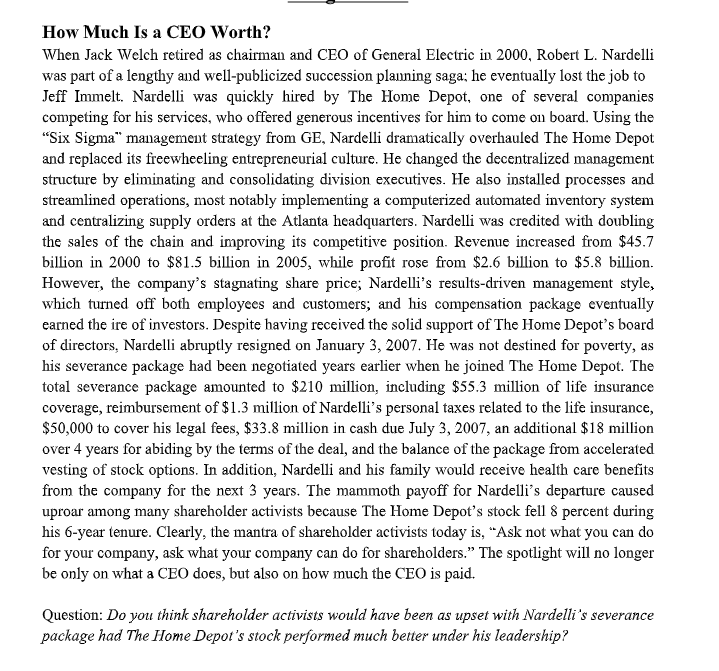
How Much Is a CEO Worth? When Jack Welch retired as chairman and CEO of General Electric in 2000, Robert L. Nardelli was part of a lengthy and well-publicized succession planning saga; he eventually lost the job to Jeff Immelt. Nardelli was quickly hired by The Home Depot, one of several companies competing for his services, who offered generous incentives for him to come on board. Using the "Six Sigma management strategy from GE, Nardelli dramatically overhauled The Home Depot and replaced its freewheeling entrepreneurial culture. He changed the decentralized management structure by eliminating and consolidating division executives. He also installed processes and streamlined operations, most notably implementing a computerized automated inventory system and centralizing supply orders at the Atlanta headquarters. Nardelli was credited with doubling the sales of the chain and improving its competitive position. Revenue increased from $45.7 billion in 2000 to $81.5 billion in 2005, while profit rose from $2.6 billion to $5.8 billion. However, the company's stagnating share price; Nardelli's results-driven management style, which turned off both employees and customers, and his compensation package eventually earned the ire of investors. Despite having received the solid support of The Home Depot's board of directors, Nardelli abruptly resigned on January 3, 2007. He was not destined for poverty, as his severance package had been negotiated years earlier when he joined The Home Depot. The total severance package amounted to $210 million, including $55.3 million of life insurance coverage, reimbursement of $1.3 million of Nardelli's personal taxes related to the life insurance, $50,000 to cover his legal fees, $33.8 million in cash due July 3, 2007, an additional $18 million over 4 years for abiding by the terms of the deal, and the balance of the package from accelerated vesting of stock options. In addition, Nardelli and his family would receive health care benefits from the company for the next 3 years. The mammoth payoff for Nardelli's departure caused uproar among many shareholder activists because The Home Depot's stock fell 8 percent during his 6-year tenure. Clearly, the mantra of shareholder activists today is, "Ask not what you can do for your company, ask what your company can do for shareholders. The spotlight will no longer be only on what a CEO does, but also on bow much the CEO is paid. Question: Do you think shareholder activists would have been as upset with Nardelli's severance package had The Home Depot's stock performed much better under his leadership? How Much Is a CEO Worth? When Jack Welch retired as chairman and CEO of General Electric in 2000, Robert L. Nardelli was part of a lengthy and well-publicized succession planning saga; he eventually lost the job to Jeff Immelt. Nardelli was quickly hired by The Home Depot, one of several companies competing for his services, who offered generous incentives for him to come on board. Using the "Six Sigma management strategy from GE, Nardelli dramatically overhauled The Home Depot and replaced its freewheeling entrepreneurial culture. He changed the decentralized management structure by eliminating and consolidating division executives. He also installed processes and streamlined operations, most notably implementing a computerized automated inventory system and centralizing supply orders at the Atlanta headquarters. Nardelli was credited with doubling the sales of the chain and improving its competitive position. Revenue increased from $45.7 billion in 2000 to $81.5 billion in 2005, while profit rose from $2.6 billion to $5.8 billion. However, the company's stagnating share price; Nardelli's results-driven management style, which turned off both employees and customers, and his compensation package eventually earned the ire of investors. Despite having received the solid support of The Home Depot's board of directors, Nardelli abruptly resigned on January 3, 2007. He was not destined for poverty, as his severance package had been negotiated years earlier when he joined The Home Depot. The total severance package amounted to $210 million, including $55.3 million of life insurance coverage, reimbursement of $1.3 million of Nardelli's personal taxes related to the life insurance, $50,000 to cover his legal fees, $33.8 million in cash due July 3, 2007, an additional $18 million over 4 years for abiding by the terms of the deal, and the balance of the package from accelerated vesting of stock options. In addition, Nardelli and his family would receive health care benefits from the company for the next 3 years. The mammoth payoff for Nardelli's departure caused uproar among many shareholder activists because The Home Depot's stock fell 8 percent during his 6-year tenure. Clearly, the mantra of shareholder activists today is, "Ask not what you can do for your company, ask what your company can do for shareholders. The spotlight will no longer be only on what a CEO does, but also on bow much the CEO is paid. Question: Do you think shareholder activists would have been as upset with Nardelli's severance package had The Home Depot's stock performed much better under his leadership







